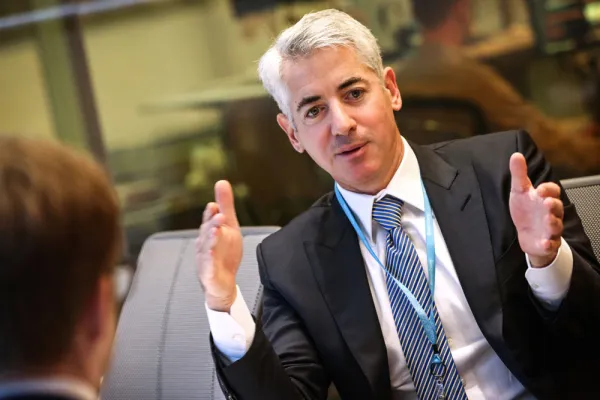In the first half of the 1990s, William Sanders was considered one of the visionaries of real estate investing, along with Samuel Zell and Milton Cooper.
By Howard Rudnitsky
April 2001
Institutional Investor Magazine
In the first half of the 1990s, William Sanders was considered one of the visionaries of real estate investing, along with Samuel Zell and Milton Cooper. These three savvy investors had realized early on that tapping the capital markets held huge promise for commercial real estate. By going public, they could access investors' money to grow.
Cooper, now retired, led the way in November 1991, offering stock in Kimco Realty Corp., his New Hyde Park, New York,based strip-shopping-center real estate investment trust. Chicago-based Zell followed a few years later, going public with three companies: Equity Residential Properties Trust, Equity Office Properties Trust and Manufactured Home Communities. Since then their REITs have yielded substantial returns for shareholders.
Sanders initially took a different approach. Unfortunately, his timing and strategy proved faulty.
Sanders, now 59, became successful by building up LaSalle Partners, a Chicago-based commercial real estate services company he started in 1968. He sold his partnership interest in the firm to Japanese insurer Dai-ichi Mutual Life Insurance Co. for an estimated $65 million in 1987. Sanders is still defensive about the timing of the sale: The commercial real estate market collapsed at the end of the 1980s, leaving Dai-ichi holding the bag. Some observers felt that Sanders had seen the coming decline and bailed. "That had nothing to do with it," he insists. "I wanted to get into real estate development and build a company from the ground up," that was instead of providing real estate services to corporations, as he had done at LaSalle.
In 1990 Sanders formed Security Capital Group to develop and acquire interests in real estate companies. Sanders, who boasts a BS in agriculture from Cornell University, wasn't content to focus on just one, two or even three real estate companies. With the financial support of several institutional investors, SCG made sizable investments in all kinds of commercial real estate businesses, ranging from apartments, industrial, retail and office complexes to corporate extended-stay and luxury hotels to storage space units to parking lots and assisted living facilities. He even bought European real estate. By 1997 SCG, with investments totaling $3.6 billion, was little more than a holding company for real estate companies, but it was a firm of dizzying complexity.
Through SCG, Sanders made controlling investments in and took positions on the boards of three publicly traded REITs , Archstone Communities Trust, Prologis Trust and Homestead Village , and took near-full ownership of a half dozen private real estate companies. SCG also had a 40 percent stake in publicly traded Security Capital U.S. Realty, a Luxembourg-based real estate holding company that Sanders had started in 1995 to accommodate the needs of his European investors. U.S. Realty, in turn, held three public REITs , CarrAmerica Realty Corp., Regency Realty Corp. and Storage U.S.A. , in addition to three private companies. SCG also built a $2 billion-in-assets real estate investment management business, Global Capital Management Group, to invest for institutions and wealthy individuals.
"Bill Sanders was never afraid of complexity," says Jacques Gordon, head of real estate research at what is now Jones Lang LaSalle in Chicago. "He did that at LaSalle Partners, and he did it again with those holding company investments like U.S. Realty. The trouble is, sometimes it gets too complex."
And how. Sanders took his smorgasbord of real estate investments and privately held companies public on September 17, 1997. With $1.65 billion in existing equity capital, Security Capital Group raised nearly $600 million in an initial public offering priced at $28 a share. Shortly thereafter, SCG's shares began to tumble. By September 1999 they had fallen below $12 a share , a decline of almost 60 percent and more than a 35 percent discount to SCG's underlying net asset value.
What went wrong? Let Sanders explain: "We were the dominant shareholder in all those companies and very involved in their strategies. We had figured we could take those companies public and that they would sell at a premium to their underlying value. Public real estate companies did sell at a premium for the first half of the 1990s. In fact, that turned out to be a flawed strategy because later on they sold at discounts to net asset value."
There was another fly in the ointment. Sanders had failed to structure pre-IPO stock to restrict the sale by institutions that had long held stock and convertible securities in SCG. As soon as the lockup period ended, two quarters later, they began selling their shares for income. "They wanted to cash out," says Sanders. "So a couple of billion [dollars worth] of sellers wanted out. Also, having our companies sell at a discount instead of a premium hit us real hard." The company's strategy of not paying dividends deepened the discount further.
Sanders himself owns some $86 million worth of class-A (supervoting) and B stock at today's prices, and , unlike his early investors , he hasn't sold a single share.
Under pressure from SCG's board and investors to prop up the company's sagging stock, Sanders started to buy in the company's bargain-priced shares. He financed these purchases by selling off $329 million in capital-intensive assets. Strategic Hotel Capital, which owned about $2 billion worth of hotels, was sold at a $55 million loss.
Sanders also set about simplifying SCG's complex corporate structure. "If it isn't simple, a public company doesn't sell," Sanders says, in rueful retrospect.
Early last year he took private the publicly traded extended-stay hotel chain Homestead Village, which was 87 percent owned by SCG. Homestead had incurred $700 million in debt by constructing hotel rooms and was producing minimal returns. Sanders slashed its expansion plans, freeing up cash, and sold off 24 older properties for an additional $80 million. With the cash freed up, Sanders reduced Homestead's debt to $458 million.
In January of this year, Sanders bought out the 60 percent of U.S. Realty that SCG did not already own. The price: 45 million SCG shares valued at $750 million, plus $112 million in cash and the assumption of $550 million in debt. Folding U.S. Realty into SCG eliminated an additional discount layer and slashed $8 million in annual expenses.
Sanders is also unloading shares in companies that SCG partially owned, but which have grown too big to acquire, like apartment REIT Archstone Communities. In late February 2001 he sold the last of a $787 million stake in that company, which enabled SCG to retire a $530 million loan.
As a result of these transactions, plus a 35.9 percent gain last year in per-share earnings before depreciation, amortization and deferred taxes, SCG's shares have rebounded from a low of less than $12 to $20.75 a share today, a gain of nearly 73 percent. But that figure is still more than 25 percent below Security Capital's 1997 IPO price. By contrast, Cooper's Kimco Realty has managed to yield an annual return of 11 percent since mid-September 1997. All three of Zell's REITs have yielded smaller, but positive, returns as well.
It could take up to four more years for Sanders to reach his ultimate goal , that of becoming an operator of no more than five or six wholly owned companies. That's a big change for a firm that, at its peak in the mid-1990s, held investments in 18 companies. Says Sanders: "Our strategy now is to own all or a very high percentage of a few real estate companies. We will be an operating company, period."
Sanders expects his companies to become competitive with Standard & Poor's 500 companies, which earn 15 to 16 percent on equity, and wants them to be service-oriented. "Look at companies like Marriott and GE," he says. "They've made an enormous push into managing and services, which doesn't take as much capital, and so their ROE goes up."
Sanders contends that his net asset value today is about $28 a share. He figures that in a few years, his remaining companies will be closer to generating S&P 500,like returns. "So, conservatively, we're selling at about a $1 billion discount to our net asset value," he asserts.
But in a report at the end of February, respected real estate analyst Craig Leupold of Green Street Advisors estimated that SCG's NAV is actually closer to $23 today. "Will you want to own this company when it becomes an operating company?" he asks. "Their results haven't been that great on some of their more recent investments. They made a sizable investment in Storage U.S.A., and the value today is less than their cost. They also had a big investment in Strategic Hotels, and they sold that at a significant loss. Homestead Village was a disappointment, and they took it private."
So far, however, the simplified style seems to be working. If he continues to narrow his focus, Sanders may someday eliminate that nagging share discount. But he'll have to do a whole lot better than that to reclaim his reputation as a real estate visionary.





